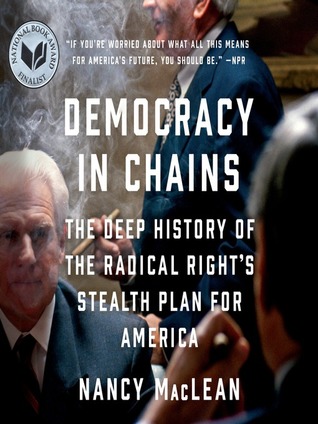Today I'm looking at another rather concerning book about the history of politics in the United States and how we got into the seemingly interminable mess that we now find ourselves. MacLean dug into archives from multiple universities and discovered what can only be called a conspiracy, spanning decades, and inspired by the ideological work of at least one man, James McGill Buchanan. This book is mostly a biography of Buchanan and his professional life until his break with the Koch brothers, forcing him into retirement. While I think it may be a stretch to say that Buchanan alone was responsible for the development of the radical right, I think it's fair to say that he was one of multiple influential figures who helped to shape the ideology of the modern right.
MacLean traces the origins of the modern right wing back to a key event in American history, Brown v. Board of Education, in 1954. Many southerners resisted this decision, and the fight for integration continued for many years, and is in many ways still ongoing. However, the overt resistance in places such as Arkansas and Mississippi were not as appealing to border regions such as Virginia. The wealthy, elite ruling classes of Virginia maintained control through systems such as poll taxes, literacy tests, and extreme gerrymandering to ensure their continued dominance of their respective states, without any challenge from ordinary people. Effectively, an oligarchy in all but name. The federal decision to force integration of public schools under the Fourteenth Amendment promised additional federal changes to existing power structures within the states, breaking the chokehold of the oligarchs. The oligarchs needed a method to resist, without bringing overt attention to their objectives Buchanan managed to provide a solution. Privatize the schools. If there are no public schools, then there can be no discrimination. Private schools can refuse blacks admittance, and the burden of taxes for public education can be removed in favor of people who desire education actually paying for it. And in fact, that's what Virginia did in Prince Edward County for five years, despite massive local protest. The state government overruled local school boards and closed all the public schools, leaving black children without education for five vital years.
Buchanan and many of his compatriots were committed to an ideology that sought to return the United States back to an era of absolute economic freedom, resembling the Gilded Age more than anything else. No minimum wage, no right to organize, and no government regulation. Buchanan and his allies in fact want to go even further, disdaining corporate welfare systems such as health insurance and pension plans provided through employers. If people want health insurance or retirement money, they'll have to do it themselves. The government should exist only to protect private property and to repress the masses.
Yes, that's actually an important aspect of their entire ideology, repressing the masses. See, here's the biggest paradox that Buchanan and his ilk discovered when trying to promote their ideology. It's actually unpopular among the majority of people. For the most part, people like having clean air and water, good schools for children, old age insurance, and a number of other government programs that have to be supported by taxes. As libertarians discovered in the 1950's and 1960's, coming out directly and stating a desire to return to Gilded Age laissez faire did not go over well with really any focus group at all. The solution for Buchanan and their wealthy supporters was to impose their system of economic ''freedom'' on the majority through a combination of voter suppression and outright deceit, gradually dismantling the U.S. support net and regulatory systems until the network is completely destroyed.
This is perhaps the most galling and aggravating thing about libertarian intellectuals is their absolute and total lack of any morality or concern for political freedoms, which becomes apparent in much of their writing. MacLean includes an example of one member of Buchanan's cadre who stated that if their program was successful, many Americans would have to live in slums like the favela in Rio de Janeiro, casually stating that the air and water might not be what Americans are used to, but they'd have to adapt. It's social Darwinism pure and simple, the poor are poor because of some sort of inherent failing or weakness. If they're willing to work hard, tighten their belts, and raise themselves by their bootstraps, they can get ahead through rough individualism. If they're not willing to put in the work, then nobody else should have to carry them. This cruel callousness fits perfectly with their nineteenth century ideology. So long as they're fine, the rest of the world can go straight to hell for all they care.
The picture that emerges is highly disturbing. A small cadre of the ultra-rich and their lackeys, working to simultaneously undermine support for social welfare and regulatory programs while disenfranchising the very masses that they seek to exploit. The rise of the radical right, funded by ultra-wealthy backers, has thrown the future of American democracy in doubt. We are in the midst of a class war, started by the upper classes, and they are in the process of winning because they have convinced a significant percentage of the lower classes that the class war is in their own best interest. It is only through organization and education that we'll be able to fight back against the upper classes and ensure the future of social democracy.
- Kalpar


No comments:
Post a Comment